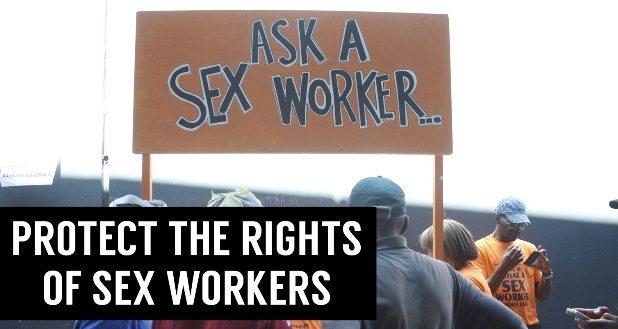On 14 June 2017, the Western Cape High Court heard a case challenging the constitutionality of the Regulation of Gatherings Act, on the grounds that it unjustifiably limits the right to freedom of assembly. Safura Abdool Karim rounds up the arguments that were made over the right to protest.
This case began in September 2013 when Phumeza Mlungwana, Zackie Achmat and 17 others chained themselves to the Cape Town Civic Centre to protest poor sanitation in their community. Under the Gatherings Act, individuals who wish to protest in public places are required to give municipal officials notice of the protest if it involves more than 15 people.
The Act defines such a protest as a ‘gathering’ and requires that municipal officials are given notice at least 48 hours beforehand. In addition to requiring prior notice for gatherings, the Act also criminalises the convening or attendance of gatherings where no notice has been given to officials, i.e. a ‘prohibited gathering’. Importantly, the Gatherings Act provides a defence to the offence of convening a prohibited gathering, if the protest occurs ‘spontaneously’. However, this defence does not apply to the charge of attending a prohibited gathering.
During the initial court proceedings, the magistrate accepted that the protest was respectful and peaceful at all times. It also was accepted the participants did not intend for number of people at the gathering to exceed 15 people. Despite this, the protestors still contravened the Gatherings Act because they did not give prior notice of the gathering to officials. As a result, they were arrested and convicted of attending a prohibited gathering and contravening the Gatherings Act.
Mlungwana and nine others then appealed their conviction and challenged the validity of the Gatherings Act, on the grounds that it unjustifiably infringes their constitutional right to freedom of assembly and peaceful protest.
The right to freedom of assembly is not absolute under the Constitution and the government can make laws to restrict this right. However, any restriction or infringement of the right must be justified under the Constitution. In essence, the protestors are arguing that the criminal offences concerning attendance at prohibited gatherings restrict the right to protest, freedom of assembly and freedom of speech in a way that cannot be justified under the Constitution. While the prior notice requirement serves an important purpose, it does not attempt to prevent actual harm and police can still regulate protests, even if no prior notice is given.
In contrast, the criminalisation of attending a prohibited gathering is a severe limitation on the right to freedom of assembly that could have a chilling effect on protests. The 15-person threshold for prior notice was also argued to be arbitrary. The protestors also highlighted how the lack of a defence and the complex notice procedure is sometimes abused by officials to prevent protests.
Before the appeal was heard in the high court, two civil society organisations, Equal Education and the Open Society Justice Initiative joined the case as ‘friends of the court’. Equal Education highlighted how the provisions of the Gatherings Act make children vulnerable to being arrested for attending protests. Their submissions drew attention to the long history of student protests for education that dates back to 1920.
Notably, the United Nations (UN) Special Rapporteur on the Right to Freedom of Peaceful Assembly and of Association was also joined as a friend of the court. UN Special Rapporteurs are tasked with investigating and reporting on human rights problems in countries. The submissions made by the Special Rapporteur in this case highlighted its importance for the right to freedom of assembly, not only in South Africa, but also at an international level. Courts in foreign countries frequently look to the decisions of the Constitutional Court in deciding on human rights issues.
In her submissions, the Rapporteur stated that prior notice is not a requirement under international law. States may request notice be given if a threshold level of disruption is anticipated to allow it to prepare for and facilitate the exercising of the right to freedom of assembly. However, this should not be used in a manner that unduly restricts the right to freedom of assembly. The Rapporteur stressed that the notification procedures should not amount to requiring state authorisation for protest activities. Ultimately, the Special Rapporteur submitted that using the criminal law was not a legitimate response by the government.
In contrast, the Minister of Police Fikile Mbalula argued that the prior notice requirement and criminalisation prohibited gathering served a legitimate purpose by deterring protestors from holding prohibited gatherings. The minister also argued that the requirement was necessary given the limited resources of the police and requested that the case be dismissed.
This case will have profound implications for freedom of assembly in South Africa, particularly given how protest action is becoming an increasingly important part of our democracy.
The parties are waiting for judgment in the matter.
The views expressed in this article are those of the author and do not necessarily reflect the editorial policies of The Daily Vox.









